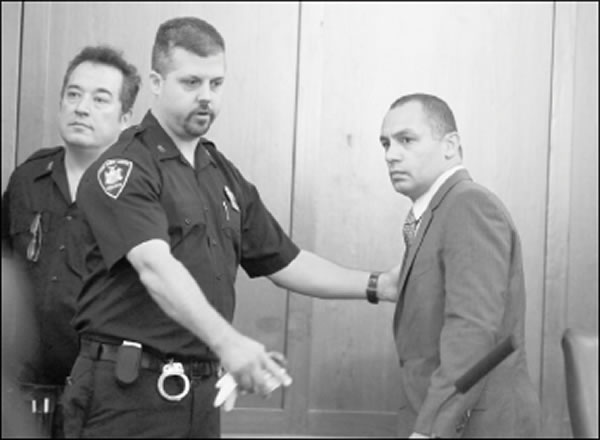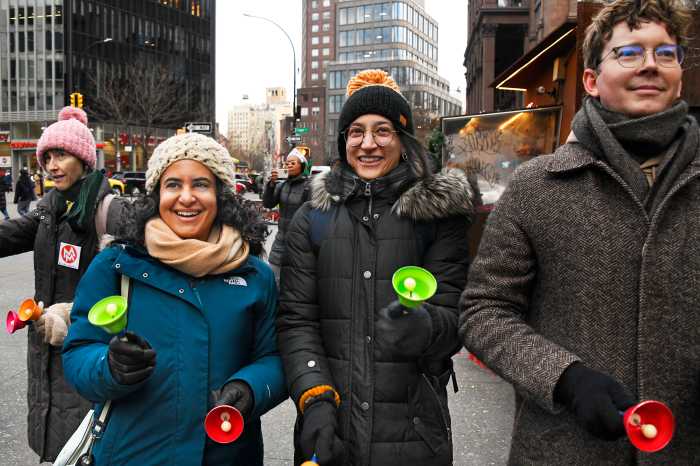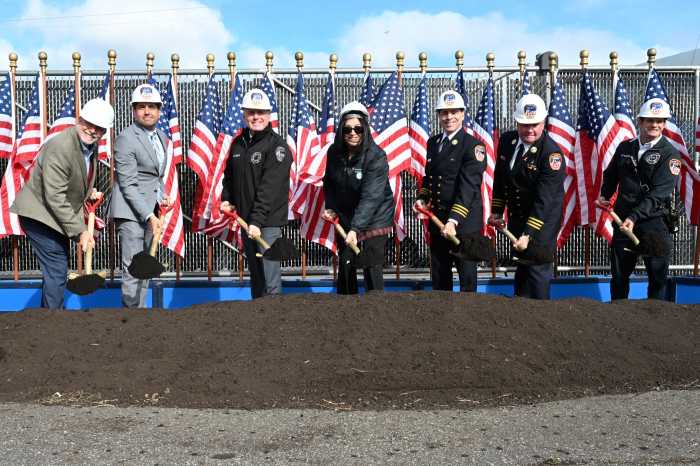By Jefferson Siegel
In a verdict that shocked the city, three months ago, two former Ninth Precinct police officers were found not guilty of raping a barely semiconscious, intoxicated East Village woman whose apartment they visited not once — but four times — in a single night while on duty in December 2008.
However, this week, justice finally caught up with the East Village “Rape Cops,” as they were both sentenced to prison time on official misconduct charges.
On Monday, ex-Officer Kenneth Moreno received a year in jail. On Wednesday, his former partner, Franklin Mata, received 60 days in jail.
At Moreno’s sentencing, an unexpected twist in events saw him jailed before being released on appeal.
The two former Ninth Precinct officers arrived at Manhattan Supreme Court Monday morning for their sentencing, the final act in a two-year-long court case. The pair, who were cleared of charges of burglary and raping the intoxicated woman in her E. 13th St. apartment one night in December 2008, each faced up to two years in jail on official misconduct convictions. Moreno is alleged to have raped the woman, while Mata said he fell asleep in another room and was unaware of what transpired.
Moreno, 43, who arrived with his attorney, Joseph Tacopina, rushed into the Downtown courthouse surrounded by photographers. A few minutes later, Mata and several family members sprinted inside.
In the front row of the packed, 13th-floor courtroom, the victim, a 29-year-old fashion executive now living in California, sat surrounded by friends. On the other side of the aisle, Moreno, a 17-year veteran of the force, and Mata, a 3-year veteran, were also buffered from the public by family members.
At 10:15 a.m. Judge Gregory Carro took the bench and a grim-looking Moreno joined his legal team at the defense table.
Assistant District Attorney Coleen Balbert, who prosecuted the case, read a lengthy summary to the judge in arguing that Moreno should be given the maximum two-year sentence.
As Balbert recounted the circumstances of the officers’ four visits to the victim’s apartment that night, the woman openly wept. Balbert accused Moreno of acting “as though he was above the law.”
“He risked having police resources expended for his own devious and selfish purposes,” Balbert said. “This was not just a stupid mistake, it was plainly and simply criminal.”
Tacopina, a prominent defense attorney, has won many high-profile cases, including an acquittal for a police officer in the Abner Louima brutalization case. He chose to make his final remarks at a podium directly in front of the victim, rather than at the defense table by his client’s side.
Sipping from a water bottle, Tacopina focused on his client’s police work, ultimately imploring the judge for no jail time because, as he said, “certainly, everyone knows the potential dangers that befall a police officer” in jail. The attorney asked that Moreno be treated like “any other defendant” and given probation, adding that Moreno had already suffered enough by losing both his job and pension.
As Tacopina attempted to downplay the seriousness of events that night, Balbert sat with her face in her hands, looking incredulous.
The judge listened intently to both statements. When it came time to sentence Moreno, he tore into the disgraced ex-cop.
“You’ve undermined the role of other police officers who have to do a tough job in this city,” Carro said while glaring at the defendant.
“The law treats police officers differently because of their roles,” he continued. “Crimes against police officers are treated more severely than crimes against civilians. If you kill a police officer, it’s murder one. If you kill Joe Smith, it’s murder two,” he said, referring to first-degree murder versus second-degree murder, the former carrying a stiffer sentence.
Carro went on to rebut several points Tacopina had made in Moreno’s defense, including Moreno’s claim that he had merely spooned with the victim as she lay incapacitated in bed while wearing nothing but a bra.
“It’s certainly not illegal to take advantage of an intoxicated woman, but it is a crime when you’re a police officer in uniform,” Carro said.
During the trial, Moreno had claimed he resisted advances from the woman, had tried to counsel her about excessive drinking and had even sung her a Bon Jovi song.
“By your own admission, while you were supposed to be ready and able to respond to an emergency, you were in bed with a naked, intoxicated female,” Carro said. “You wanted to get into that apartment so badly you committed a crime in order to do so,” the judge noted, referring to a phony 911 call Moreno had made about a nonexistent vagrant in a doorway on the woman’s block in order to be sent back to her neighborhood.
“Your testimony was classic for admitting what you couldn’t deny and denying what you couldn’t admit,” Carro concluded.
Although Moreno could have been jailed for a year on each of the two counts, Carro said the law required the terms be served concurrently.
Tacopina made one final plea, claiming Moreno had just gained custody of his teenage daughter and wanted to spend some time with her. He asked Carro for a 20-day delay, which Carro denied without hesitation. Moreno was led out of court and sent to Rikers Island.
A half-dozen women, wearing red to protest Moreno’s actions, seemed relieved at the outcome. Meanwhile, just rows away, Moreno’s family sat, arms intertwined, looking shocked and stunned.
Tacopina left the blockhouse confines of the Criminal Court Building and headed up to the Beaux Arts-style Appellate Division Court on 25th St. and Madison Ave. Late that afternoon Appellate Judge Nelson Roman sided with Tacopina and ordered Moreno released on $125,000 bail while his appeal is pending.
In any case, Moreno will be back in court on Sept. 12 to face drug-possession charges for a packet of heroin that was found in his locker at the Ninth Precinct.
In addition, the woman in the E. 13th St. incident has a $57 million civil suit pending against the city.
Also late Monday afternoon, dozens of people gathered in Foley Square to protest the two officers’ prior acquittal on rape charges. Chanting, “N.Y.P.D., shame on you!” and “No more rape cops!” they called on Police Commissioner Ray Kelly to take crimes against women by police more seriously.
One of the jurors in the case, Christopher Hazeltine, was in court for the sentencing.
“I think he disregarded the jury’s verdict,” Hazeltine said of Judge Carro, adding that the sentence should have been based on a police patrol guide violation, which would have avoided a jail sentence.
Other jurors had previously said there wasn’t enough evidence to convict Moreno of rape. After the verdict was delivered in May, one unnamed juror was quoted as saying, “Is it possible they raped her? Sure.”
City Councilmember Rosie Mendez, whose district covers the East Village, said of Monday’s sentencing, “The judge’s decision to sentence former Officer Moreno to a year in jail, the maximum sentence possible based on the finding of the jury, confirms that the public trust was violated. It is a sound decision that reinforces to all New Yorkers that there are consequences for abusing authority.”
On Wednesday morning, Moreno’s partner, Mata, was sentenced to 60 days in jail and three years probation. He was allowed to leave court but must return on Sept. 12 to begin serving his sentence.








































